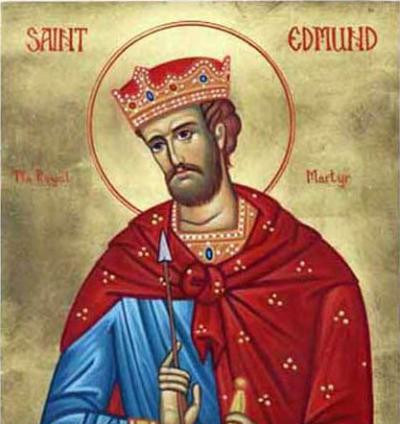
Saint of the Day November 20: St. Edmund
St. Edmund: the holy king who made peace his mission
Name
St. Edmund
Title
King of the Eastern Angles, martyr
Birth
9th Century, Nuremberg, Germany
Death
November 20, 870, Thetford, England
Recurrence
20 November
Martyrology
2004 edition
Protector of
Sovereigns, victims of torture
Roman Martyrology
In England, St. Edmund, martyr, who, king of the Eastern Angles, captured in the war against invading pagans, was crowned with martyrdom for faith in Christ.
The Saint and Mission
St. Edmund, king and martyr, is a historical figure who exemplarily embodies the Christian mission in the context of his royal role and the political challenges of his time. Born in the 9th century and becoming king of East Anglia, his life and martyrdom offer a powerful narrative of faith, courage, and dedication to Christian principles in a time of great turmoil.
St. Edmund’s mission was intrinsically linked to his role as ruler. He saw his kingship not simply as a temporal power, but as a mandate to rule with justice, compassion and according to Christian values. His leadership was characterized by a commitment to social justice and the protection of his people, especially the most vulnerable and defenseless.
At a time of increasing threat from the Vikings, St. Edmund faced enormous challenges that tested his loyalty and commitment to his people and his faith. His refusal to abjure his Christian faith in the face of threats and violence demonstrates the depth of his missionary commitment. Edmund’s choice to face martyrdom rather than give in to the demands of his attackers was a powerful testimony to his unconditional love for Christ and his unwavering commitment to live by Gospel principles.
St. Edmund’s martyrdom was not only an act of personal courage but also a pivotal moment in the history of the Church in England. He became a symbol of Christian endurance and faithfulness, inspiring countless faithful to remain steadfast in their faith in the face of adversity and persecution.
St. Edmund’s life and martyrdom represent a mission lived out through faithful and courageous service, both as a political leader and as a witness for Christ. His legacy reminds us that Christian mission can be lived out in any context and circumstance, and that sometimes the greatest witness we can offer is fidelity to our faith, even in the face of the supreme sacrifice.
The Saint and Mercy
St. Edmund, king and martyr, offers a singular interpretation of mercy in the context of his role as ruler and witness to the faith. As king of East Anglia in the 9th century, his reign was marked by an approach that integrated justice and mercy, demonstrating how power and authority can be exercised with compassion and humility.
St. Edmund’s mercy was mainly manifested in his rule. He sought to rule with equity, showing concern for the welfare and justice for all his subjects, especially the weakest and the poor. This concern for the needs of his subjects reflected his understanding of kingship as a service, not as a mere expression of power.
Moreover, St. Edmund is remembered for his magnanimity even toward his enemies. Even in the face of violence and the threat of the Vikings, he maintained a posture that combined firmness in principles with a disposition for forgiveness. His ability to remain true to his Christian principles while facing extreme threats demonstrates a deep internalization of mercy as a Christian virtue.
St. Edmund’s martyrdom is perhaps the most significant expression of his mercy. In his choice to face death rather than deny his faith or compromise his principles, he demonstrated a love and dedication beyond mere compassion. His sacrifice is a powerful example of how mercy, understood as supreme love, can lead to an act of extreme witness.
St. Edmund’s life teaches us that mercy is not only an act of kindness toward others; it is also a profound approach to life and governance, based on principles of justice, love and service. His example of kingship exercised with mercy remains an inspiring model for all those called to positions of leadership, reminding us that true power is found in serving with love and always putting the welfare of others first.
Hagiography
He is a saint more alive in the popular memory of England than in many pages of historical documents. And alive especially for the manner and reasons of his death. But we know little about him, and that little is also poorly told. As for his origins, historians, in fact, reject the tradition that Edmund was the son of King Alkmund of Saxony, born in Nuremberg and then adopted by the king of East Anglia.
All we know is that Edmund is the last king of this territory, in very hard times for all of England, which is continually attacked by the Danes. Who at first are a fleet that goes out to board the island, landing, pillaging, killing, and…
